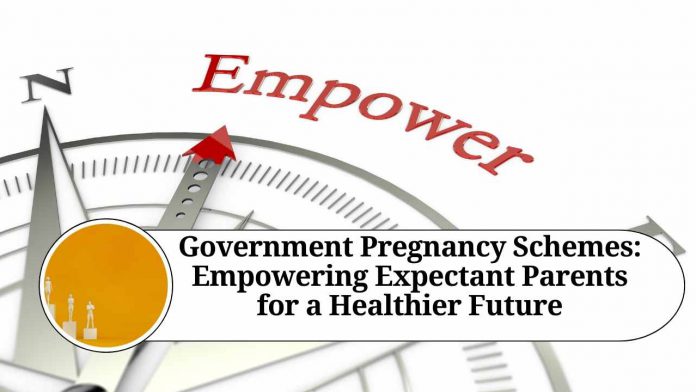Introduction:
Becoming a parent is an incredible journey that brings joy, excitement, and a multitude of responsibilities. Recognizing the importance of supporting expectant parents, governments around the world have introduced various pregnancy schemes. These schemes aim to provide financial, medical, and emotional assistance to pregnant women and their families, ensuring a healthier and more secure future for both mother and child. In this blog, we will explore the significance of government pregnancy schemes, their benefits, and the impact they have on society.
- Maternity Benefits: One of the primary focuses of pregnancy government schemes is to provide financial support to expectant mothers. Maternity benefits typically include cash allowances or grants to help cover the additional expenses incurred during pregnancy, childbirth, and postnatal care. These benefits assist families in meeting the medical needs of the mother, ensuring access to quality healthcare services, and alleviating the financial burden often associated with starting a family.
- Prenatal and Postnatal Healthcare: Government pregnancy schemes also emphasize the importance of prenatal and postnatal healthcare. These initiatives offer free or subsidized medical check-ups, tests, and consultations throughout the pregnancy, ensuring the well-being of both mother and child. By providing adequate healthcare services, governments aim to reduce maternal and infant mortality rates, enhance the overall health outcomes of newborns, and promote healthy development during the crucial early stages of life.
- Nutrition and Supplements: Nutrition plays a vital role in the health and development of both the mother and the growing fetus. Many government schemes recognize this and provide additional support through the provision of nutritional supplements, such as prenatal vitamins and iron supplements. These supplements help meet the specific nutritional requirements during pregnancy, reducing the risk of deficiencies and promoting healthy growth and development.
- Education and Counseling: Apart from the physical well-being, pregnancy schemes often offer educational programs and counseling services to expectant parents. These programs cover a wide range of topics, including prenatal care, breastfeeding, infant care, parenting skills, and family planning. By providing comprehensive information and guidance, governments ensure that parents are equipped with the knowledge and skills necessary to raise healthy and happy children.
- Maternity Leave: Many countries have introduced paid maternity leave policies as part of their pregnancy schemes. Maternity leave allows expectant mothers to take time off work before and after childbirth, ensuring they have adequate rest and bonding time with their newborns. This provision acknowledges the physical and emotional demands of pregnancy and childbirth, enabling parents to provide the best possible care for their child during the crucial early months.
- Social Support and Community Engagement: Government pregnancy schemes also foster social support networks and encourage community engagement. These initiatives often establish platforms for expectant parents to connect with each other, share experiences, and seek guidance. By creating a sense of community and support, governments aim to reduce social isolation, enhance mental well-being, and promote a nurturing environment for both parents and children.
Conclusion:
Government pregnancy schemes are a significant step towards ensuring the well-being and development of expectant parents and their children. These initiatives provide crucial financial, medical, and emotional support, empowering families to navigate the journey of pregnancy with greater confidence and security. By investing in the health and welfare of expectant mothers, governments play a vital role in building a healthier and more prosperous future for generations to come.
Read more useful content:
Frequently Asked Questions (FAQs)
Q1: What is a government pregnancy scheme?
A1: A government pregnancy scheme is a program initiated by the government to provide financial, medical, and emotional support to expectant mothers and their families.
Q2: Who is eligible to benefit from government pregnancy schemes?
A2: Eligibility criteria may vary depending on the country and scheme. Typically, pregnant women or expectant parents meeting certain income thresholds or residency requirements can benefit from these schemes.
Q3: What types of financial assistance are provided through government pregnancy schemes?
A3: Financial assistance may include cash allowances, grants, or subsidies to help cover expenses related to prenatal care, childbirth, postnatal care, and baby essentials.
Q4: Are medical services provided as part of government pregnancy schemes?
A4: Yes, government pregnancy schemes often include free or subsidized prenatal check-ups, medical tests, and consultations to ensure the well-being of both mother and child.
Q5: Do government pregnancy schemes cover the cost of childbirth?
A5: In many cases, government pregnancy schemes provide coverage for childbirth expenses, including hospital stays, delivery charges, and necessary medical procedures.
Q6: Can I receive nutritional support through government pregnancy schemes?
A6: Yes, many schemes offer nutritional support in the form of prenatal vitamins, iron supplements, or dietary guidance to meet the specific nutritional requirements during pregnancy.
Q7: Are there educational resources available through government pregnancy schemes?
A7: Yes, government pregnancy schemes often provide educational programs, workshops, and counseling services covering various topics like prenatal care, breastfeeding, parenting, and family planning.
Q8: Do government pregnancy schemes offer maternity leave benefits?
A8: Many countries include provisions for paid maternity leave as part of their pregnancy schemes, allowing expectant mothers to take time off work before and after childbirth.
Q9: Can expectant fathers also benefit from government pregnancy schemes?
A9: Some schemes extend benefits to expectant fathers or partners, recognizing their role and providing support for the well-being of the whole family.
Q10: How can I access information about government pregnancy schemes in my country?
A10: Information about government pregnancy schemes can be obtained from government websites, local health centers, social welfare offices, or by contacting relevant government departments responsible for maternity and child welfare.




















